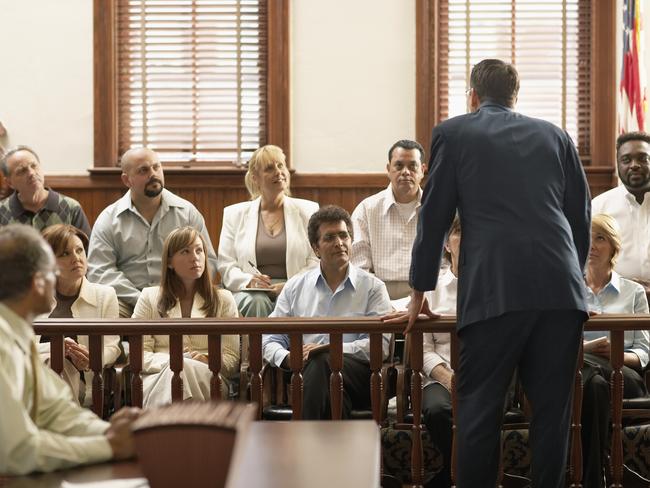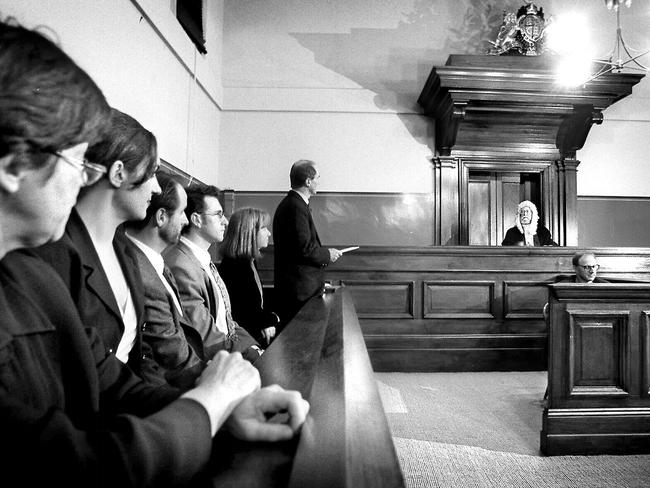Guilty or not guilty? What life is like sitting on a criminal jury
YOU are summoned to court for jury service. Then what? Are you really ready to pass judgment on a fellow citizen — because you may have no choice.
IT’S almost as terrifying a thought as being the defendant. As many as eight months sitting in a courtroom, listening carefully, with a heavy burden on your shoulders.
This is the reality facing 12 Sydney men and women who could find themselves part of a trial that could last the rest of the year.
Regardless of what the trial’s evidence contains — and they are rarely, if ever, as exciting as the movies — taking in all that information will test even the most dedicated and committed person.
There is no doubt it would also be life-changing, albeit in a temporary way. Everything from income, to your daily routine would change — in effect the jurors who are selected would take on new jobs for next few months.
Senior Sydney barrister Ian Lloyd, QC, told news.com.au there was no doubt such trials were hard on jury members. But the challenges could be overcome.

“I did a trial in Hong Kong many years ago now when they only had juries of seven. And I prosecuted a fraud trial that went for nine months, so seven members of community on that trial sat for the entire nine months, and they paid attention to all evidence.”
His view was there was no substitute for jury trials. But for such a long case, there were obvious concerns about jurors getting burned out and distracted.
“Of course you get concerned by those things. But experience tells us even in long trials jurors, by and large, do approach their tasks assiduously and those issues [like the lack of attention] came be overcome.”
That was usually avoided by regular days off, or shortened days off, especially on a Friday afternoon. That gave lawyers a chance to regroup and jurors an opportunity to get ordinary chores done, like go to the bank or other appointments.
But even getting onto the jury can be a complicated process.
SELECTION
There is much at stake in trial, people’s freedom, their reputation. Often a jury decision will change the course of a defendant’s life, along with all of the people associated with the case like witnesses and a defendant’s family.
Naturally, who actually serves on a jury is taken seriously by the courts. Both the prosecution and defence can veto a potential jury member without explanation. Those vetos are called “challenges” and each side gets three each.
If you are called from the jury pool (it’s done by drawing names from a ballot box) and don’t need to be excused, then you take your seat on the jury bench — unless you are “challenged” by one of the lawyers, in which case your involvement in the case ends.
Mr Lloyd told news.com.au in a trial with multiple accused there could conceivably be dozens of challenges once the Crown’s own challenges were factored in.
WHAT YOU GET PAID
For a short trial, less than 10 days, each juror gets $106.30 a day. For anything longer the rate increases to $239.20.
The courts also pay 30.7c per km for travel
Lunch is a sandwich, fruit and drink, with hot meals getting served after a trial enters the sixth day. If you want to bring your own lunch there is an allowance of $7 a day.
In such a long case the entire first day — and more likely a second day — can be consumed by selecting the jury members.
In this case Mr Lloyd estimated as many as 100 people could be called to the court for the jury to be selected from.
Even that might not be enough. “They may discover quite quickly that they need to call more people to join the pool.”
Of greater concern on very long trials was that a juror could be forced off the jury through some unexpected event, like illness.
That’s when the “reserves” come in.
“There is a provision in legislation to have reserve jurors,” Mr Lloyd explained.
That means as well as the initial 12 jurors being selected two or three reserves were as well. “Experience tells us there is a high probability that one or two jurors won’t go the whole way.”
EXCUSES AND EXEMPTIONS
Judges, lawyers, police, politicians and most people working in the justice system are not allowed to serve on juries, but most other people are. People can ask to be excused and if they have a valid reason, the judge can excuse them from sitting on that particular jury. It does not excuse you from jury service forever.
The excuses people come up with to avoid serving on a jury can be amusing. Some actually offered in Australian courts have included needing to look after their cat, to a phobia of public transport, and a belief the person would fall asleep in court.
Those with genuine reasons are excused. These can include work commitments or health reasons, basically anything that could genuinely cause you hardship. Because the NSW trial starting soon is so long great care is taken in selecting each member, to not only avoid impacting their life but also to reduce the chances of jeopardising the trial itself if a jury member has to withdraw suddenly.

Simply ignoring your summons isn’t advisable either. Last year, News Corporation revealed that in NSW alone 16,000 people were fined $1100 each for not showing up. Those people learned the hard way that ignoring the summons and hoping it would go away could become a costly exercise.
Mr Lloyd has no sympathy for those people.
“The bottom line is every member of society has to be aware jury service is a privilege and not a duty.”
He said our system had been formulated over many hundreds of years and had been proven to be the fairest criminal justice system.
Part of the reason why it was successful was each jury member had to take their responsibility seriously — because if they were the ones in the dock they would want 12 members of their peers to be giving the evidence their full attention.
Still, there were concerns in long trials about a jury member staying focused.
“There’s no doubt sitting on long trial is a big ask, but that’s the price we pay living in democracy like Australia where the rule of law reigns supreme.”
Originally published as Guilty or not guilty? What life is like sitting on a criminal jury



